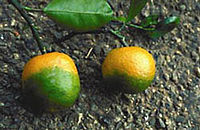
Photo from wikipedia
Symbiotic bacteria play a critical role in insect’s biology. They also offer great opportunities to improve on current pest management techniques. In order to exploit and integrate the roles played… Click to show full abstract
Symbiotic bacteria play a critical role in insect’s biology. They also offer great opportunities to improve on current pest management techniques. In order to exploit and integrate the roles played by the gut microbiota on pest management programs, a better understanding of the structural organization of the microbial community in the Chinese citrus fly Bactrocera minax is essential. The results revealed a total of 162 OTUs at 97% similarity interval. The dominant bacteria phyla were Proteobacteria, Bacteroidetes, Antinobacteria and Firmicutes, with the Proteobacteria having the highest relative abundance (more than 80% in all life stages). There was also a shift in the dominant OTUs from the early developmental stages to the late developmental stages and adult stages in B. minax. These OTUs related to Klebsiella pneumoniae, Providencia rettgeri and Enterobacter aerogenes, respectively. Six bacteria OTU were shared by all the life stages. These belonged to the Enterobacteriaceae and the Enterococcaceae families. The common bacteria groups shared by all the life stages and other fruit flies could be important targets for further research. This should aim towards realizing how these bacteria affect the biology of the fly and how their relationship could be exploited in the development of sustainable management strategies against fruit flies.
Journal Title: BMC Microbiology
Year Published: 2019
Link to full text (if available)
Share on Social Media: Sign Up to like & get
recommendations!